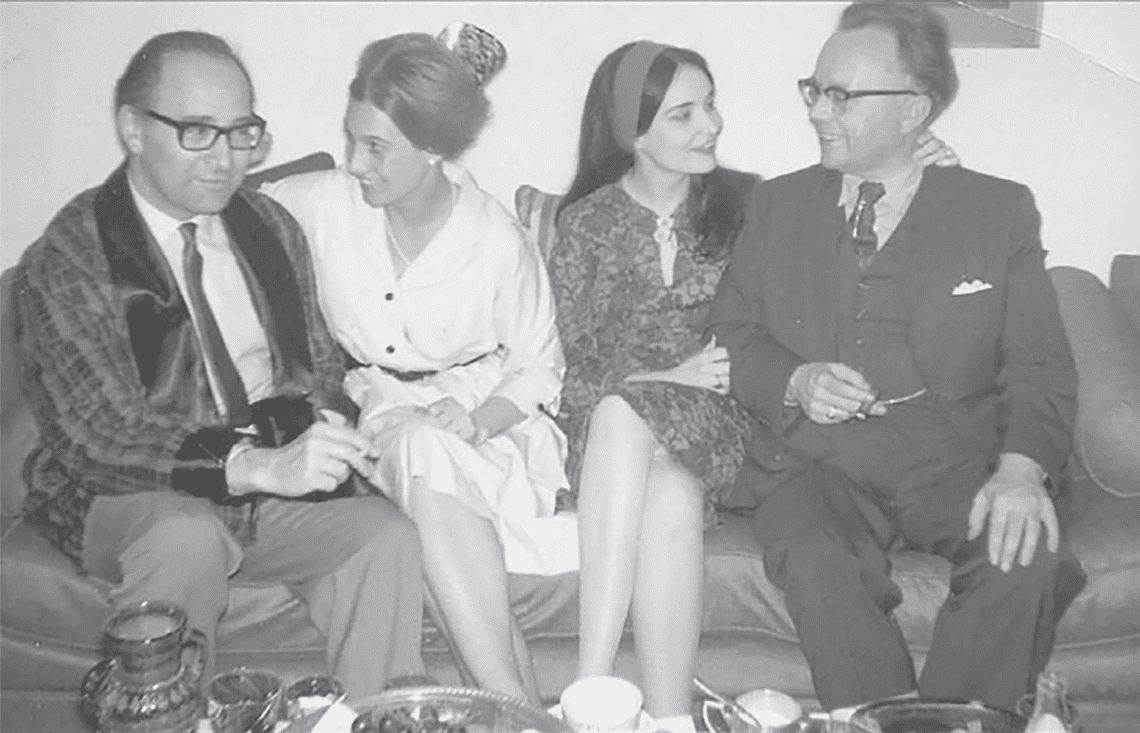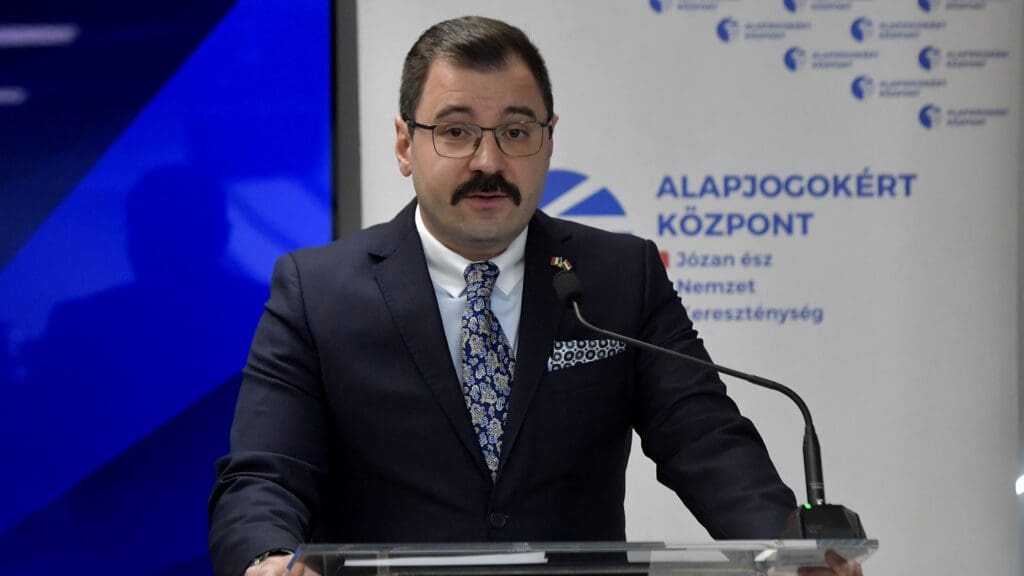An international conference entitled Thomas Molnar in Context was held in Budapest on 17 November 2023, organized by the Eötvös József Research Centre at the University of Public Service (UPS), the Thomas Molnar Research Institute, the Danube Institute and The European Conservative in the Zrínyi hall of the Ludovika building of the UPS campus.
In his short speech introducing the event, head of the Thomas Molnar Research Institute, historian of political thought Károly Attila Molnár highlighted that as a Hungarian emigrant, Thomas Molnar tacitly accepted the values of liberal democracy in the United States, but criticized its ideological foundations and pointed out the dangers of ‘Americanization’, the consequences of economic liberalism and social engineering. Molnar was able to resist the fascist temptation stemming from the desire for order, because he realized that human nature is necessarily imperfect. Molnár reminded that before 1990, the conservative philosopher was absent from Hungarian intellectual life, and he was first ‘noticed‘ in the French, Spanish and Italian speaking countries.
David Martin Jones, representing the Danube Institute, talked about Molnar’s early recognition of the intellectual decline in Western culture. According to him, we can witness the general strengthening of utopian thinking. A combination of Marxism and progressive liberal ideology dominates the university world, which has become the scene of utopian manipulation. While Molnar’s goal was to preserve the freedom of philosophizing, education today is increasingly turning into political activism, David Martin Jones argued.
According to Alvino-Mario Fantini, editor-in-chief of The European Conservative, Molnar is not very well-known in today’s intellectual life. Molnar looked at the processes of modernity in a pessimistic way, and he was right about many things, in fact, he proved to be a prophet. He was unpopular among American conservatives because of his views criticizing economic liberalism, but this seems to be changing nowadays, Fantini noted, and highlighted that Molnar questioned the central elements of the liberal heritage and stood up for the values of hierarchy and sanctity.
Gergely Kucsera Tamás gave a lecture on the relationship between Thomas Molnar and the Hungarian Academy of Arts (MMA). He emphasized that although he could not become a member of the current organization due to his death in 2010, he was a member of the institution’s predecessor. The speaker was one of Molnar’s students at the Pázmány Péter Catholic University, where debates continued even after class in a more informal setting. In his inaugural lecture held in 1994 at the legal predecessor of the MMA, Molnar discussed the contemporary possibility of philosophizing: according to him,
the institutionalized view of philosophy contradicts its original meaning;
in that regard, Molnar shared the late position of French Catholic philosopher Jacques Maritain, as he did not consider ideology to be philosophy.
Historian of ideas, research institute director at Századvég Gábor Megadja analysed the lessons of Molnar’s book on Georges Bernanos titled Bernanos: His Political Thought and Prophecy. In the book Molnar opined that the criticism of liberalism by Bernanos was completely justified, and that there are always opportunities to act against liberal hegemony. According to Molnar, Bernanos was not a systematic philosopher; his thinking was rather determined by following the truth, as a spiritual and moral absolutist, who advocated for the preservation of tradition and rejected any form of compromise.
Lecturer and Tutor at Blackfriars Studium in Oxford, former Mathias Corvinus Collegium research fellow and author of a recent book on Molnar, Jan Bentz spoke about the relationship between Thomas Molnar and Thomism. In Bentz’s view, Molnar is considered to be a Catholic political philosopher, he can hardly be classified as belonging to a single philosophical school. According to Bentz, Molnar represented a realist synthesis between extreme positions regarding the possibility of knowing the truth. In Molnar’s view, anyone who denies the existence of objective reality is not a philosopher, but a sophist, just like atheists who deny the source and meaning of existence with the denial of the existence of God.
Wolfgang Fenske, the director of the Berlin Bibiothek des Konservativismus, compared the thinking of Thomas Molnar with that of Armin Mohler and emphasized: the debate between the two thinkers can also be linked to the opposition between realism and nominalism. Mohler was associated with the idealism of the German conservative revolution, and his debate with Molnar, one between two conservative intellectual schools, took place in the Critikon magazine. While Molnár criticized political subjectivism, but according to Mohler, it is no longer possible to return to the traditional order assumed to be of divine origin.
Serbian political scientist Dušan Dostanić spoke about the parallels between the French counter-revolutionary Charles Maurras and Thomas Molnar. According to him, Maurras had a great influence on many generations of French intellectuals, as he was not only an ideologue and a politician. His newspaper Action Française expressed the literary taste of the political right. He represented the classical spirit of authority and aristocracy and traced the cause of the problems of modern society back to the Reformation. He was particularly preoccupied with the future role of the intelligentsia, which, in his view, had caused its own decline. French-educated Molnar respected the likes of Maurras and Bernanos, the reactionary type without power. Like Maurras, Molnar’s situation was also controversial, according to their views, the ‘intelligentsia’ caused its own decline.
Czech journalist, commentator, translator and author Michal Semin spoke about the relationship between Thomas Molnar and the Catholic Church. He reminded that Molnar endorsed the position of traditional, conservative Catholicism before the Second Vatican Council and was very concerned about the situation of the Church. He confronted those who preached the need to adapt to the spirit of the age, considered the Second Vatican Council to be destructive, and sympathized with the movement of Archbishop Marcel Lefebvre, who opposed it.
Historian of ideas and political scientist Áron Czopf, editor of the Hungarian-language conservative journal Kommentár, delivered a presentation on Thomas Molnar’s critique of existentialism: according to him, this is also a critique of modernity, since Molnar held that all forms of modern thinking are utopian. Existentialism claimed to be the defence of the individual in the age of mass society, and Molnar considered Sartre and Heidegger as its main representatives. According to Molnar, utopian thinking is an eternal heresy as the hatred of suffering is actually the hatred of reality itself. Molnar critiqued Heidegger, who said God is not an ontological fact, but only an eschatological possibility, and Sartre, who argued that God can come to life when man loses himself, that is, deification is a possibility inherent in man: a pseudo-ethical concept used to cover up nihilism.
German political scientist Till Kinzel analysed Thomas Molnar’s criticism of political utopianism. According to him, Utopia is part of human thinking, which helps give meaning to reality, but attempts to put it into practice have a heavy price. In Molnar’s view, this stems not only from mistakes made during practical implementation, but also from the essence of utopian thinking itself, which does not take into account the limitations of human nature and considers it changeable and perfectible. Utopia connects theology and politics: even before the collapse of existing socialism in Central and Eastern Europe,
Molnar pointed out that Marxist ideology, which considers itself scientific, is contrary to human nature.
Zoltán Pető, a researcher of the Thomas Molnar Institute, spoke about Molnar’s criticism of liberal hegemony. According to him, Molnar’s entire oeuvre can be considered a critique of the Enlightenment and modernity. Molnar’s worldview is based on divine transcendence, and his view of man is not hedonistic; the way he saw it, the ontological structures of existence are not determined by material values, which is why he criticized liberalism’s materialistic and ‘market-orientated’ thinking. Molnar defined liberalism as the ideology of civil society and had the courage to question the progressive, evolutionist narrative, the views that interpret history as development, which have become dominant since the 18th century.
US political scientist Eric Kos sought to answer the question of what Thomas Molnar’s place in late modernity is. He emphasized that Molnar rejected the idea of progress leading to the dissolution of the church and the state, criticized the utopian efforts to create a conflict-free society, as, according to Molnar, man is unable to transcend his basic nature. He endorsed the Thomistic and Aristotelian views that what is necessary is also good, and the church and the state are part of creation.
Renowned Spanish legal philosopher Miguel Ayuso Torres talked about the possibilities of ‘two powers’ in theology. According to him, the common good has lost its meaning in political postmodernism, but Molnar’s book Utopia, the Eternal Heresy provides an answer to the cultural, political and religious situation of the world, and to the weakening of the state. The book, like The Liberal Hegemony, is also a critique of the American model of social organization. According to Professor Ayuso, Molnar defended the importance of the metaphysical foundation of institutions on Hegelian grounds, but Hegelian logic can be problematic, especially if we look at it from a Christian-Catholic standpoint.
History professor John Rao described his relationship with Thomas Molnar as a ‘defining friendship’ in his presentation entitled ‘Americanism and Pluralism’, which closed the conference. According to him, the American system, following John Locke’s logic, ensures freedom, while reduces everything to the individual who wants to decide for himself about reality. Integrating freedom into everyone else’s freedom, however, is a controversial endeavour. As Professor Rao put it, a kind of civil religion has been invented in America to protect social peace and freedom, a secularized Puritan teaching, in which the cultic respect for the founders and their documents also leads to mental disorders. Subordinating everything to one goal and at the same time claiming that we have never been freer is a ‘split consciousness’ state, he stated. Subordination to the will of the founders is just as problematic as identifying the common good with self-interest, the professor concluded.








